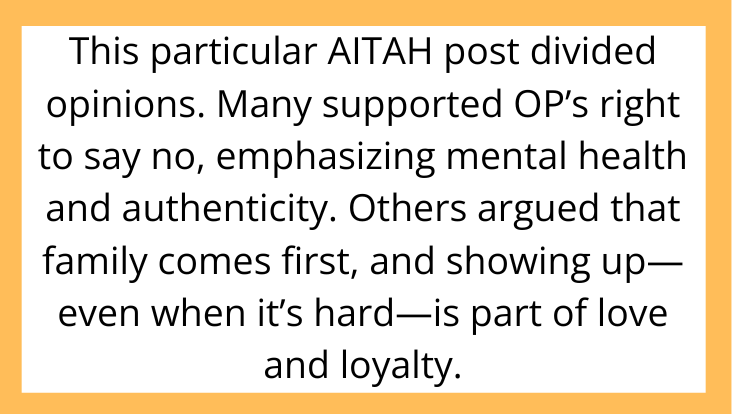AITAH for Refusing to Attend My Sister’s Baby Shower Because I Don’t Like Kids?
Family events like baby showers are often seen as joyful celebrations, but what happens when you simply don’t enjoy being around children? Recently, a post on r/AITAH asked if it was wrong to skip a sister’s baby shower because of a personal dislike for kids. This sparked intense debate about family expectations, personal boundaries, and social obligations.
In this blog post, we’ll explore the different sides of this dilemma, why saying no to family events isn’t always selfish, and how to handle such situations with honesty and care.
The Scenario: When Personal Feelings Clash with Family Traditions

The original poster (OP) shared that their sister was excited about her upcoming baby shower and expected all close family to attend. However, OP openly dislikes kids and large gatherings, feeling uncomfortable and anxious in those settings. Rather than pretending to enjoy the event, OP decided to skip it altogether.
The sister was hurt and felt OP was being unsupportive during an important life milestone. Extended family members called OP selfish and accused them of ruining the occasion. OP questioned if their feelings made them the bad person for choosing personal comfort over social expectations.
Understanding Why Skipping Family Events Isn’t Always Selfish

Many people believe that attending family celebrations is a non-negotiable duty. But the reality is more nuanced:
-
Personal comfort matters: Attending events that cause anxiety or discomfort can harm your mental health.
-
Authenticity counts: Faking enthusiasm or forcing yourself to participate may strain relationships more than a respectful absence.
-
Boundaries build respect: Clearly communicating your limits shows you care enough to be honest.
Family dynamics are complex, and no one should feel pressured to attend every event at the expense of their own well-being.
How to Say No Gracefully: Tips for Managing Expectations

If you find yourself in a similar situation, consider these approaches to preserve relationships while respecting your boundaries:
-
Communicate early: Let your family know as soon as possible about your decision and your reasons.
-
Offer alternative support: Suggest spending time with the expectant mother one-on-one or sending a thoughtful gift.
-
Be empathetic: Acknowledge that the event is important to them and express your good wishes sincerely.
-
Stay consistent: Maintain your boundaries firmly but kindly to avoid misunderstandings.
This balance helps minimize hurt feelings and keeps the door open for future connection.
Why Family May React Strongly — And How to Handle It

Sometimes, family members interpret refusal to attend as rejection or a lack of love. This often stems from:
-
High emotional investment in milestone events.
-
Cultural or generational expectations around family unity.
-
Fear that the relationship may weaken.
Recognizing these feelings allows you to respond with empathy, reinforcing that your absence isn’t a personal slight but a self-care decision.
What Does the Internet Say?

This particular AITAH post divided opinions. Many supported OP’s right to say no, emphasizing mental health and authenticity. Others argued that family comes first, and showing up—even when it’s hard—is part of love and loyalty.
The takeaway? There’s no universal “right” answer, but respect, honesty, and compassion are key to navigating these sensitive moments.
Final Thoughts: Balancing Family Love and Personal Boundaries

Refusing to attend your sister’s baby shower because you don’t like kids doesn’t automatically make you the bad guy. It means you know your limits and choose self-care over obligation. That said, the way you communicate your choice can make all the difference in maintaining family harmony.
If you’re struggling with similar family expectations, remember:
-
Your feelings are valid.
-
Setting boundaries is healthy.
-
Relationships can survive honesty paired with empathy.



